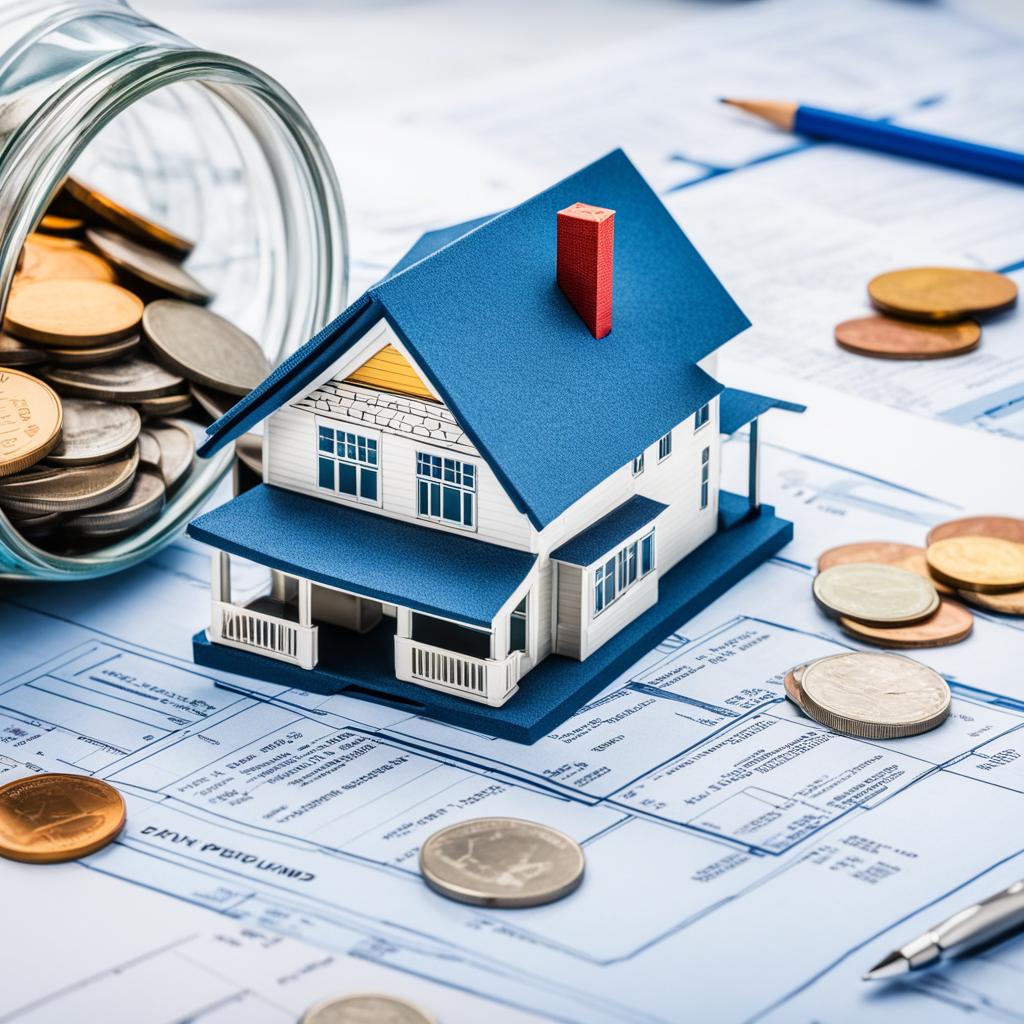Hello there! Are you a new real estate investor looking to make a mark in the industry? If so, you’ve come to the right place. In this comprehensive guide, I’ll take you through the ins and outs of house flipping and provide you with valuable tips and strategies to get you started on your journey to success.
House flipping is a popular strategy in real estate investing where you buy properties, make necessary repairs or renovations, and sell them for a profit. It’s an exciting venture that can be highly lucrative if approached correctly.
Throughout this guide, we’ll go over the key steps involved in house flipping, including choosing the right strategy, obtaining a real estate license, securing funding, researching market conditions, and building a reliable network. By the end, you’ll have a solid foundation of knowledge to kickstart your house flipping business.
Key Takeaways:
- House flipping involves buying properties, making repairs, and selling them for a profit.
- Choosing the right strategy, obtaining a real estate license, securing funding, researching market conditions, and building a reliable network are crucial steps in successful house flipping.
- Patience, good judgment, and careful financial planning are key qualities for house flippers.
- Consider multiple financing strategies and explore different markets to find the best opportunities for house flipping.
- Flipping houses can be a lucrative venture, but it requires careful planning, research, and execution.
What is House Flipping?
House flipping is the process of buying real estate property with the intention of selling for profit. It involves purchasing a property, making necessary repairs or renovations, and then selling it at a higher price. Unlike buying a house to live in or rent, house flipping focuses on buying properties for the purpose of selling them at the right time to maximize profits.
If you’re new to the concept of house flipping, it’s important to understand the fundamentals of this real estate investment strategy. Let’s take a closer look at the process and what it entails.
Flipping houses is a popular strategy among real estate investors because it offers the potential for significant returns. By identifying undervalued properties, making strategic renovations, and timing the market correctly, investors can generate substantial profits.
House flipping involves buying real estate property, making necessary repairs or renovations, and then selling the property at a higher price.
Before diving into the world of house flipping, it’s important to develop a clear understanding of the market and the strategies involved. In the following sections, we will explore different house flipping strategies, the benefits of getting a real estate license, smart funding strategies, researching market conditions, building a reliable network, estimating costs and profits, and other factors to consider for a successful house flip.
Different House Flipping Strategies
When it comes to flipping houses, there are various strategies you can employ to maximize your profits. Each strategy has its unique approach and considerations depending on the type of property and market conditions. Here are some of the most popular house flipping strategies:
1. Fix and Flip
The fix and flip strategy involves purchasing distressed properties at a lower price, renovating or repairing them to increase their value, and then selling them for a profit. This strategy requires a keen eye for identifying properties with potential and managing construction and renovation projects effectively. It can be a lucrative strategy if executed properly.
2. Foreclosure
Flipping foreclosed properties involves purchasing homes that have been repossessed by lenders due to the owner’s inability to pay their mortgage. These properties are often sold at a discounted price, offering an opportunity to buy low and sell high. However, navigating the foreclosure market may require extensive research and legal knowledge.
3. Short Sale
A short sale occurs when a homeowner sells their property for less than the outstanding mortgage balance, with the lender’s approval. This strategy allows investors to negotiate a lower purchase price and potentially secure a good deal. However, completing a short sale transaction can be complex and time-consuming, requiring patience and strong negotiation skills.
4. Buy and Hold
Unlike traditional house flipping, the buy and hold strategy focuses on acquiring properties with the intention of holding them for rental income or long-term appreciation. This strategy can provide a steady stream of cash flow and potential tax advantages. However, it requires careful analysis of rental market demand and property management skills.
“Understanding the different house flipping strategies allows investors to choose the approach that aligns best with their goals, skills, and available resources. Each strategy has its own set of challenges and rewards.”
A successful house flipper often combines multiple strategies depending on the specific market conditions and property opportunities. The key is to thoroughly research and analyze properties, determine the most suitable strategy for each project, and execute it with precision to maximize profits.
The Benefits of Getting a Real Estate License
As a house flipper, obtaining a real estate license can provide numerous advantages that can boost your success in the industry. With a license, you have the ability to list and sell your own properties, eliminating the need to rely on listing agents. This not only saves you money on commissions but also gives you full control over the selling process. By acting as your own listing agent, you can strategically market and showcase your properties to potential buyers, ensuring that you maximize your profits.
Moreover, having a real estate license enables you to develop expert knowledge of the local market. Through continuous education and networking opportunities, you can stay up-to-date with market trends, property values, and neighborhood dynamics. This valuable insight allows you to make informed decisions when acquiring properties and determining the optimal selling price. Additionally, being a licensed real estate professional grants you access to exclusive resources and tools that can enhance your house flipping endeavors.
One of the key benefits of having a real estate license is the advantage it provides when negotiating deals. As a licensed professional, you possess the skills and knowledge to navigate the intricacies of real estate transactions. You can confidently negotiate with buyers, sellers, and other industry professionals to secure favorable terms and conditions. This expertise can result in significant savings and higher profits for your house flipping business.
By obtaining a real estate license, you position yourself as a reputable and professional house flipper. Clients and investors are more likely to trust and engage with licensed individuals, recognizing the commitment and dedication required to acquire and maintain a license. This increased credibility can attract potential partners, lenders, and buyers, expanding your network and opening doors to new opportunities.
Investing the time and effort to obtain a real estate license can undoubtedly be a wise decision for house flippers. It offers financial benefits, market knowledge, enhanced negotiation skills, and increased credibility. By becoming a licensed professional, you gain a competitive edge in the real estate industry and increase your chances of success in your house flipping ventures.
Smart Strategies for Funding Your House Flip
When it comes to house flipping, funding plays a vital role in your success. While buying a property in cash is the ideal scenario, it may not always be feasible, especially for new real estate investors. In these cases, exploring other financing options becomes necessary. Let’s take a look at some smart strategies for funding your house flip.
1. Save Money and Buy in Cash
Before delving into financing options, it’s always wise to save up as much money as possible to buy a property in cash. This eliminates the need for loans or mortgages and allows you to have complete ownership of the property. Additionally, purchasing in cash can give you a competitive advantage when negotiating deals, as sellers often prefer cash buyers.
2. Mortgage Process
If buying in cash is not feasible, obtaining a mortgage is a common financing option for many house flippers. The mortgage process involves applying for a loan from a financial institution, such as a bank, to facilitate the purchase of the property. It’s essential to have a good credit score and a reliable source of income to increase your chances of approval. However, keep in mind that lenders may be cautious about working with inexperienced flippers.
3. Loans for Flippers
In addition to mortgages, there are specialized loans available specifically for house flippers. These loans are designed to provide funding for the purchase of the property as well as any necessary repairs or renovations. While these loans can be a convenient option, keep in mind that they often come with higher interest rates and strict repayment terms. It’s crucial to carefully consider the terms and assess your ability to make timely payments.
4. Alternative Financing Options
In some cases, traditional financing options may not be accessible. In such situations, exploring alternative financing options can be beneficial. Some alternatives include private investors, hard money lenders, or even joint ventures with experienced flippers. These options may come with different terms and conditions compared to traditional financing options, so it’s essential to thoroughly research and consider the pros and cons before proceeding.

When it comes to funding your house flip, having a solid financial plan and understanding your options is crucial. Whether you choose to save for a cash purchase, pursue a mortgage, or explore alternative financing options, make sure to carefully consider the terms and assess the feasibility of each option before making a decision. Ultimately, the right funding strategy will set the foundation for a successful house flipping venture.
Researching Market Conditions
Before diving into house flipping, it’s essential to research market conditions. Understanding the local real estate market and identifying future trends can greatly impact the success of your house flipping venture. By analyzing market conditions, you can pinpoint areas with affordable prices and high potential for growth. This section will guide you through the process of researching market conditions and help you make informed decisions in your house flipping journey.
Why Research Market Conditions?
Researching market conditions provides valuable insights that can help you identify lucrative house flipping opportunities. Here’s why it’s crucial:
- Identify areas with affordable prices: Researching market conditions allows you to identify neighborhoods or regions where property prices are relatively low. This creates opportunities for buying at a bargain rate and maximizing your potential profits.
- Discover areas with growth potential: By analyzing the local real estate market, you can identify areas that are already popular or show signs of future development. Look for areas with job creation, improving amenities, good school quality, proximity to essential services, and positive environmental conditions.
- Maximize your return on investment: Flipping houses is typically a short-term investment. Therefore, focusing on areas with growth potential and increasing property values can help you buy low and sell high, maximizing your return on investment.
Market Research Strategies
When conducting your market research, consider the following strategies:
- Local Real Estate Market Analysis: Gather data on recent property sales, average sale prices, and the time properties spend on the market. This information will give you insights into market trends and demand.
- Job Growth and Economic Factors: Assess the local job market and economic conditions. Look for areas with stable job growth and a diverse economy, as this can contribute to a robust real estate market.
- Evaluating Amenities and Infrastructure: Evaluate the availability and quality of amenities such as schools, shopping centers, parks, and public transportation. Properties located in areas with desirable amenities tend to attract buyers and can provide a higher return on investment.
- Environmental Conditions: Consider the environmental factors such as pollution levels, natural disasters, and climate. Properties in areas with favorable environmental conditions can be more appealing to potential buyers.
Conducting thorough research on market conditions will empower you to make informed decisions and increase your chances of success in the house flipping industry. So take the time to analyze the local real estate market, identify areas with growth potential, and make calculated decisions based on your research.
Building a Reliable Network
When it comes to flipping houses, building a reliable network of professionals can make all the difference in your success. As you embark on your house flipping journey, it’s crucial to connect with trusted contractors, experienced real estate agents, and financial professionals who can provide valuable guidance and support.
Trusted contractors are the backbone of any successful house flipping project. They have the expertise to assess the condition of a property accurately and perform quality repairs or renovations. Building a strong relationship with reliable contractors ensures that your projects are completed on time and within budget.
Equally important are experienced real estate agents who possess local market knowledge and negotiation skills. They can help you find lucrative properties, navigate the buying and selling process, and provide valuable insights into market trends. With their assistance, you can make well-informed decisions and secure profitable deals.
Financial professionals also play a vital role in your house flipping endeavors. Mortgage brokers, for example, can help you explore financing options and secure loans or lines of credit. They can guide you through the application process, ensuring that you have the necessary funds to purchase and renovate properties.

Home inspectors are another valuable resource in your network. They can identify potential issues and provide detailed assessments of a property’s condition. With their expert advice, you can make informed decisions about necessary repairs and renovations, saving you both time and money.
“Building a reliable network of professionals is essential for success in the house flipping business. By working with trusted contractors, experienced real estate agents, financial professionals, and home inspectors, you can streamline your house flipping projects and maximize your profits.”
By surrounding yourself with a trusted network of professionals, you gain access to a wealth of knowledge and expertise. These industry professionals can offer invaluable advice, support, and insights throughout the entire house flipping process.
| Professional | Role |
|---|---|
| Trusted Contractors | Provide quality repairs or renovations |
| Experienced Real Estate Agents | Offer local market knowledge and negotiation skills |
| Financial Professionals | Assist with financing options and secure loans |
| Home Inspectors | Identify potential property issues and provide assessments |
Understanding the Time Frame for Flipping a House
Flipping a house is an exciting venture, but it’s important to have a realistic understanding of the time frame involved. Contrary to what is often portrayed on TV, house flipping is not a quick process. It requires careful planning, extensive renovations, and effective marketing strategies to ensure a successful sale. On average, it can take around six months or more to complete a flip, depending on various factors such as the extent of repairs and market conditions.
The time frame for flipping a house typically includes several key phases:
- Buying: This involves searching for suitable properties, conducting thorough inspections, negotiating the purchase price, and finalizing the transaction. The time it takes to find the right property can vary depending on market availability and personal preferences.
- Restoring: Once the property is acquired, extensive renovations are often necessary to improve its condition and increase its market value. This can include repairs, upgrades, and remodeling. The duration of the restoration process depends on the scope of work and the availability of contractors.
- Marketing: After the renovations are completed, it’s time to market the property to potential buyers. This involves staging the house, creating appealing listing materials, and utilizing various marketing channels. The duration of the marketing phase can vary depending on the competitiveness of the market and the effectiveness of the marketing strategies.
- Selling: The final phase of flipping a house is the actual sale. This involves negotiating offers, conducting inspections, and closing the deal. The time it takes to sell the property can depend on various factors such as the desirability of the location, the condition of the property, and the overall state of the real estate market.
It’s important to be prepared for the potential delays that may arise during each phase of the flipping process. Unexpected issues can arise during renovations, inspections, or negotiations, which may extend the overall time frame. Additionally, market conditions can impact the speed at which a property sells.
While the time frame for flipping a house may seem lengthy, it’s important to remember that patience and careful planning are key to maximizing profits. Rushing the process can result in costly mistakes or missed opportunities. By understanding the time commitment involved, you can effectively manage your resources and navigate the various stages of flipping a house with confidence.
| Phase | Average Duration |
|---|---|
| Buying | 2-3 months |
| Restoring | 2-4 months |
| Marketing | 1-2 months |
| Selling | 1-2 months |
Choosing the Right Location for Flipping Houses
When it comes to flipping houses, one of the most critical factors for success is choosing the right location. The location of a property can greatly impact its marketability, potential for appreciation, and overall profitability. To make informed decisions, thorough market analysis is crucial.
During the market analysis process, consider various aspects that can influence the success of your house flip. Evaluate job creation in the area, as a growing job market often translates to an increased demand for housing. Additionally, assess the amenities available in the vicinity, such as shopping centers, parks, schools, and recreational facilities. These amenities can attract potential buyers and increase the attractiveness of the property.
Another vital consideration is the quality of schools in the area. Buyers with families or planning to start a family prioritize access to excellent education opportunities. Proximity to essential services and transportation links is equally important, as convenience plays a significant role in property desirability.

Cleanliness and environmental conditions should not be overlooked. Properties located in well-maintained and environmentally friendly neighborhoods are more likely to attract buyers and command higher prices. By choosing a location that offers a pleasant living environment, you enhance the chances of a successful and profitable house flip.
When conducting market analysis, also explore areas with the potential for future growth and property value appreciation. Look for signs of upcoming developments, such as infrastructure projects, new businesses, or community revitalization plans. These indicators can be strong signals of an emerging real estate market.
Don’t hesitate to venture beyond your local area to explore other markets. While local knowledge can be advantageous, it’s essential to consider opportunities in nearby cities or regions that may offer better conditions for house flipping. Expanding your horizons can lead to greater investment potential and open doors to new opportunities.
Here’s a breakdown of key considerations when choosing a location:
| Factors to Consider | Description |
|---|---|
| Job Creation | Assess the job market in the area, as a growing job market often leads to increased demand for housing. |
| Amenities | Evaluate the availability of shopping centers, parks, schools, and other amenities that enhance the quality of life and attract potential buyers. |
| School Quality | Consider the reputation and quality of schools in the area, as it greatly influences homebuyers’ decision-making process. |
| Proximity to Services and Transportation | Ensure the property is conveniently located near essential services and transportation links for ease of access. |
| Cleanliness and Environmental Conditions | Properties in well-maintained and environmentally friendly neighborhoods are more appealing to buyers, increasing their marketability and potential profitability. |
| Future Growth Potential | Look for areas with signs of upcoming development, such as infrastructure projects or community revitalization plans, as they indicate potential property value appreciation. |
By thoroughly researching and analyzing different locations, you can position yourself for success in the competitive house flipping market. Remember, location is a crucial aspect that can make or break your house flip, so choose wisely.
Financing Strategies for House Flipping with Limited Capital
Flipping houses without significant liquid capital can be a challenging endeavor. However, there are financing strategies available that can help you overcome this obstacle and pursue profitable house flipping opportunities.
One financing strategy to consider is wholesaling. Wholesaling involves entering into contracts with buyers and sellers, essentially acting as a middleman. Instead of purchasing the property yourself, you find a buyer and assign the contract to them for a fee. This allows you to earn profits without having to invest large sums of money upfront.
Another option to explore is hard money loans. Hard money lenders specialize in providing short-term loans for real estate investments, including house flipping. These loans are typically secured by the property, and they often cover not only the purchase price but also funds for renovations and repairs. While hard money loans may come with higher interest rates and fees, they can be a valuable resource for financing your house flip.
An alternative financing strategy is the “option to buy” policy. With this approach, you lease a property with the right to purchase it at a predetermined price within a specified timeframe. This gives you the flexibility to secure a property with limited upfront capital and allows you to assess its potential for a profitable flip before committing to the purchase.
Comparison of Financing Strategies for House Flipping
| Financing Strategy | Pros | Cons |
|---|---|---|
| Wholesaling | – Requires minimal upfront capital – Flexibility to earn profits without purchasing the property – Low financial risk |
– Reliance on finding buyers and sellers – Limited control over the transaction process – Potential limitations in earning potential |
| Hard Money Loans | – Access to funds for property purchase and renovations – Quick approval process – Potential for higher loan amounts |
– Higher interest rates and fees – Short loan terms – Rigorous application requirements |
| Option to Buy Policy | – Limited upfront capital required – Opportunity to assess property potential before purchase – Flexibility to walk away from a deal |
– Potential limitations on property selection – Time constraints for exercising the option – Negotiation challenges |
Each financing strategy has its own advantages and considerations. When deciding on a financing strategy for your house flipping venture, consider your financial situation, risk tolerance, and the specific requirements of each option. It’s also crucial to consult with real estate professionals and financial advisors to ensure you make informed decisions that align with your goals.
Factors to Consider when Estimating Costs and Profits
Estimating costs and potential profits plays a crucial role in the success of house flipping. As an investor, it’s essential to thoroughly analyze various factors to ensure accurate estimations. Consider the following key factors when estimating costs and profits:
Carrying Costs:
Carrying costs refer to the expenses associated with owning and maintaining a property during the flipping process. These costs include mortgage payments, insurance, taxes, and utilities. It’s important to carefully evaluate and factor in these costs to avoid unexpected financial burdens that can eat into your profits.
Repair Costs:
Accurately assessing repair costs is vital for a successful house flip. Repair costs can vary depending on the condition of the property and the extent of renovations needed. Get detailed quotes from contractors and consider potential additional expenses that may arise during the renovation process. By conducting a thorough evaluation, you can avoid underestimating repair costs and ensure they are properly budgeted for.
Home Inspection:
Conducting a comprehensive home inspection is crucial in identifying potential issues that may affect your budget. Hire a qualified inspector to assess the property thoroughly. They can help uncover hidden problems such as structural issues, plumbing or electrical concerns, or any other issues that require attention. By addressing these issues early on and factoring them into your budget, you can avoid costly surprises down the line.

Negotiation Skills:
Strong negotiation skills are invaluable when it comes to securing the best deals on both properties and repairs. Negotiating favorable purchase prices can significantly impact your potential profits. Additionally, negotiating with contractors can help ensure you get competitive pricing for renovations and repairs. Skillful negotiation can help you save money and maximize your returns.
By carefully considering these factors and diligently conducting thorough evaluations, you can create accurate estimations of costs and potential profits for your house flipping venture. This will enable you to make informed decisions and increase your chances of success.
The Importance of Patience and Good Judgment
Patience and good judgment are crucial qualities in the house flipping business. In this competitive market, timing plays a significant role in determining the success of your flip. It’s important to remember that market conditions can greatly impact your profitability. As an aspiring house flipper, you must develop the patience to wait for the right moment to buy and sell properties.
Exercise good judgment when selecting properties for your flips. Conduct thorough research and analysis to identify undervalued properties with the potential for profitable renovations. By making informed decisions, you can avoid investing in properties that may not yield optimal returns.
Additionally, good judgment comes into play during the renovation process. Adapt your renovations according to the target market and be mindful of current design trends. It’s essential to strike a balance between modernizing the property and ensuring a high return on investment.
Timing is also critical when determining the optimal time to sell the flipped property. Keep a close eye on the real estate market and monitor trends that may affect property prices. By carefully assessing market conditions, you can strategically time the sale to maximize profits and minimize the risk of holding the property for too long.
The Role of Patience
Patience is essential when it comes to house flipping. Rushing the process can lead to costly mistakes or missed opportunities. By exercising patience, you give yourself the opportunity to thoroughly analyze the market, identify the right properties, and negotiate favorable deals.
It’s important to note that house flipping is a long-term investment, requiring dedication and perseverance. Rome wasn’t built in a day, and neither is a successful house flipping business. Having a patient mindset allows you to weather the challenges that may arise during the flipping process, ultimately setting you up for long-term success.
Applying Good Judgment
Good judgment is vital for making informed decisions throughout the house flipping journey. From property selection to renovation choices to timing the sale, your ability to exercise good judgment can greatly impact your bottom line.
“Good judgment comes from experience, and a lot of that comes from bad judgment.” – Will Rogers
Experience plays a significant role in shaping your judgment. By learning from past mistakes and continuously expanding your knowledge, you can develop a keen sense of what works and what doesn’t in the world of house flipping. Trust your instincts, but also rely on data-driven analysis to validate your decisions.
Remember, success in the house flipping business is a combination of patience, good judgment, timing, and a deep understanding of market conditions. By honing these qualities, you position yourself for a profitable and fulfilling journey in the exciting world of house flipping.
The Pros and Cons of Flipping Houses vs. Investing in REITs
When it comes to real estate investing, there are two primary approaches: flipping houses and investing in Real Estate Investment Trusts (REITs). While both strategies have their advantages, it’s essential to understand the pros and cons of each before making a decision. Let’s explore the key factors to consider when comparing flipping houses to investing in REITs.
The Pros of Flipping Houses
- Potential for higher profits: Flipping houses can offer significant returns on investment if done correctly. By purchasing undervalued properties, making strategic renovations, and selling them at the right time, you can earn substantial profits.
- Active involvement: Flipping houses allows you to be actively involved in every step of the process. From selecting properties to managing renovations and marketing, you have full control over the project.
The Cons of Flipping Houses
- Significant capital required: Flipping houses often requires a substantial upfront investment. You need access to capital to purchase properties, cover renovation costs, and manage other expenses.
- Risk and unpredictability: Flipping houses comes with inherent risks. Market conditions, unexpected repairs, and delays can impact your profits. Additionally, the real estate market can be unpredictable, making it challenging to accurately predict future sales prices.
The Pros of Investing in REITs
- Steady profits: Investing in REITs provides a more passive income stream. REITs distribute dividends regularly, offering a stable source of income.
- No overhead costs or management responsibilities: Unlike flipping houses, there are no renovation or marketing costs involved with investing in REITs. Additionally, you don’t have to worry about property management or tenant issues.
The Cons of Investing in REITs
- Potentially lower returns: While investing in REITs can provide steady profits, the returns may be lower compared to flipping houses. The passive nature of this investment strategy means the potential for huge profits may be limited.
- Lack of control: When investing in REITs, you have limited control over the decision-making process. The performance of your investment depends on the decisions made by the REIT management.
Ultimately, the decision between flipping houses and investing in REITs depends on your financial situation, goals, and personal preferences. If you have significant capital and enjoy the active involvement of flipping houses, it may be the right choice for you. On the other hand, if you prefer a more passive investment approach with steady income, investing in REITs can be a suitable option. Consider your risk tolerance and desired level of involvement before making a decision.
| Flipping Houses | Investing in REITs |
|---|---|
| Potential for higher profits | Steady profits |
| Active involvement | No overhead costs or management responsibilities |
| Significant capital required | Potentially lower returns |
| Risk and unpredictability | Lack of control |
The Best Cities for Flipping Houses
When it comes to flipping houses, location is key. Choosing the right city can significantly impact your success as a house flipper. Here are some of the best cities for flipping houses:
Pittsburgh
Pittsburgh is a city with a booming real estate market, making it an ideal location for house flipping. With its affordable housing prices and steady population growth, Pittsburgh offers great opportunities for flipping houses at a lower cost and selling them at a higher price.
Cleveland
Cleveland is another city that has shown potential for house flipping. With its diverse neighborhoods, low property prices, and a thriving rental market, Cleveland offers attractive investment opportunities for house flippers. Additionally, the city’s efforts to revitalize neighborhoods and boost economic development make it an appealing choice for flipping houses.
Wilmington
Wilmington is a hidden gem for house flippers. This city in Delaware offers reasonable property prices, a strong rental market, and a growing economy. Flippers can take advantage of the city’s historical charm by renovating older properties and attracting buyers seeking unique homes.
Philadelphia
Philadelphia, with its rich history and diverse neighborhoods, presents excellent opportunities for house flipping. The city’s strong demand for quality housing, coupled with an expanding job market, makes it a favorable location for flippers. Philadelphia’s active real estate market and potential for property appreciation add to its appeal.
While these cities have shown promise for house flipping, it’s essential to conduct thorough research and analysis for each specific market. Consider factors such as market trends, local regulations, and the availability of skilled contractors and suppliers.
| City | Average Housing Price | Monthly Rent |
|---|---|---|
| Pittsburgh | $200,000 | $1,200 |
| Cleveland | $150,000 | $1,000 |
| Wilmington | $250,000 | $1,500 |
| Philadelphia | $300,000 | $1,800 |
Table: Average housing prices and monthly rent in the best cities for flipping houses
Conclusion
Flipping houses can be an exciting and profitable venture for beginners in the real estate investing world. By carefully planning, conducting thorough research, and executing your strategies effectively, you can maximize your profits and grow your house flipping business. Remember that success in this industry requires patience, good judgment, and continual learning.
As a beginner, it’s important to choose the right house flipping strategy that aligns with your goals and resources. Whether it’s fix and flip, foreclosure, short sale, or buy and hold, understanding the different strategies will help you make informed decisions.
In addition, securing funding and building a reliable network of professionals are crucial steps in your house flipping journey. Explore financing options, such as mortgages or loans for flippers, and establish relationships with trusted contractors, real estate agents, and financial professionals who can support you along the way.
To maximize your profits and ensure long-term success, always research market conditions, choose the right locations, and carefully estimate costs and potential profits. Consider factors such as job creation, amenities, and future trends to make informed decisions about which properties to invest in.
Remember, house flipping is a long-term investment, and growing your business requires continuous learning and improvement. Stay patient, exercise good judgment, and adapt to market conditions as you strive to become a successful house flipper. With dedication and the right strategies, you can achieve your financial goals and build a thriving house flipping business.
FAQ
What is house flipping?
House flipping is the process of purchasing a property with the intention of selling it for a profit. It involves buying real estate property, making necessary repairs or renovations, and then selling the property at a higher price.
What are the different house flipping strategies?
Some popular house flipping strategies include fix and flip, foreclosure, short sale, and buy and hold.
What are the benefits of getting a real estate license?
Getting a real estate license can save you money on commissions, give you more control over the selling process, and provide expert knowledge of the local market.
How can I finance my house flip?
You can finance your house flip by buying in cash, exploring mortgage options, or securing loans specifically designed for house flippers.
How do I research market conditions for house flipping?
Research local real estate markets to identify areas with affordable prices and potential for growth. Consider factors such as job creation, amenities, school quality, and future development.
How can I build a reliable network for house flipping?
Build relationships with trusted contractors, experienced real estate agents, financial professionals, and home inspectors who can offer valuable advice and services.
How long does it take to flip a house?
Flipping a house can take around six months or more, depending on the extent of repairs and market conditions.
What factors should I consider when choosing a location for flipping houses?
Consider factors such as job creation, amenities, school quality, proximity to services and transportation, cleanliness, and environmental conditions.
How can I finance a house flip with limited capital?
Consider options such as wholesaling, hard money loans, or utilizing the “option to buy” policy to finance a house flip with limited capital.
What factors should I consider when estimating costs and profits?
Consider carrying costs, repair costs, conduct a thorough home inspection, and hone your negotiation skills to accurately estimate costs and maximize profits.
What qualities are important for success in house flipping?
Patience, good judgment, timing, and market conditions are critical for success in the house flipping business.
What are the pros and cons of flipping houses vs. investing in REITs?
Flipping houses offers the potential for higher profits but requires more active involvement and significant capital. Investing in REITs provides steady profits without the overhead costs and risks associated with flipping houses.
What are the best cities for flipping houses?
Some cities that have shown potential for house flipping include Pittsburgh, Cleveland, Wilmington, Philadelphia, and other locations with growing economies and favorable real estate markets.
How can I get started in house flipping as a beginner?
To get started in house flipping as a beginner, follow the steps outlined in this guide, including choosing a strategy, securing funding, researching market conditions, building a reliable network, and continuously expanding your knowledge and experience.
Our Friends
- https://www.investopedia.com/articles/mortgages-real-estate/08/house-flip.asp
- https://millennialmoney.com/how-to-flip-houses/
- https://www.obererhomes.com/how-to-flip-houses-for-beginners/
Money posts:
 Best Items to Flip Part-Time ($50-5000 A Month!) (2024)
Best Items to Flip Part-Time ($50-5000 A Month!) (2024)
 13 Best Real Estate Investing Books (2024)
13 Best Real Estate Investing Books (2024)
 Best Real Estate Investing Apps (2024)
Best Real Estate Investing Apps (2024)
 How To Build A Real Estate Empire Before You’re 30
How To Build A Real Estate Empire Before You’re 30
 22 Real Estate Side Hustles for 2024
22 Real Estate Side Hustles for 2024
 Rental Property Due Diligence Checklist (2024)
Rental Property Due Diligence Checklist (2024)
 How to Buy an Investment Property
How to Buy an Investment Property
 11+ Best Real Estate Websites (2024)
11+ Best Real Estate Websites (2024)

